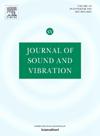振动梁中涡流引起的能量耗散数值分析
IF 4.3
2区 工程技术
Q1 ACOUSTICS
引用次数: 0
摘要
振动衰减是机械工程的一个重要方面。实现这一目标的方法之一是通过涡流,当磁场存在时,涡流会在振动系统中产生,从而产生反向运动力。本研究考察了一个机械系统,该系统由一根薄悬臂梁组成,在稳态条件下,悬臂梁在均匀且不随时间变化的磁场中振动,从而了解能量耗散的性质以及运动、涡流和阻尼力之间的关系。计算涡流通常需要使用复杂的数值程序。然而,对于几何形状简单的系统,如悬臂梁,最近一种基于有限差分法的数值计算程序因其实施简单而闻名,经过调整和扩展后可用于确定运动感应下的涡流。我们开发了一种数值应用,通过其弯曲或扭转模态形状来描述特定横梁的振动,并分析相应耗散力的性质。结果表明,涡流是消散低阶模态能量的有效手段。此外,外加磁场的方向可诱发弯曲振动和扭转振动之间的耦合。本文章由计算机程序翻译,如有差异,请以英文原文为准。
Numerical analysis of energy dissipation due to eddy currents in a vibrating beam
Vibration attenuation is a key aspect of mechanical engineering. One method to achieve this is through eddy currents, which can be generated in a vibrating system when a magnetic field is present, creating forces that oppose motion. This study examines a mechanical system consisting of a thin cantilever beam vibrating in a uniform and time-invariant magnetic field under steady-state conditions to understand the nature of energy dissipation and the relationship between motion, eddy currents, and damping forces. The calculation of eddy currents generally requires the use of complex numerical procedures. However, for systems with simple geometry, such as a cantilever beam, a recent numerical procedure based on the finite difference method, known for its simplicity in implementation, has been adapted and expanded to determine eddy currents under motional induction. A numerical application has been developed in which the vibration of a specific beam is characterised by its bending or torsional mode shapes, and the nature of the corresponding dissipative forces is analysed. Results indicate that the eddy currents are an effective means of dissipating energy at lower-order modes. Additionally, the direction of the applied magnetic field can induce coupling between bending and torsional vibrations.
求助全文
通过发布文献求助,成功后即可免费获取论文全文。
去求助
来源期刊

Journal of Sound and Vibration
工程技术-工程:机械
CiteScore
9.10
自引率
10.60%
发文量
551
审稿时长
69 days
期刊介绍:
The Journal of Sound and Vibration (JSV) is an independent journal devoted to the prompt publication of original papers, both theoretical and experimental, that provide new information on any aspect of sound or vibration. There is an emphasis on fundamental work that has potential for practical application.
JSV was founded and operates on the premise that the subject of sound and vibration requires a journal that publishes papers of a high technical standard across the various subdisciplines, thus facilitating awareness of techniques and discoveries in one area that may be applicable in others.
 求助内容:
求助内容: 应助结果提醒方式:
应助结果提醒方式:


